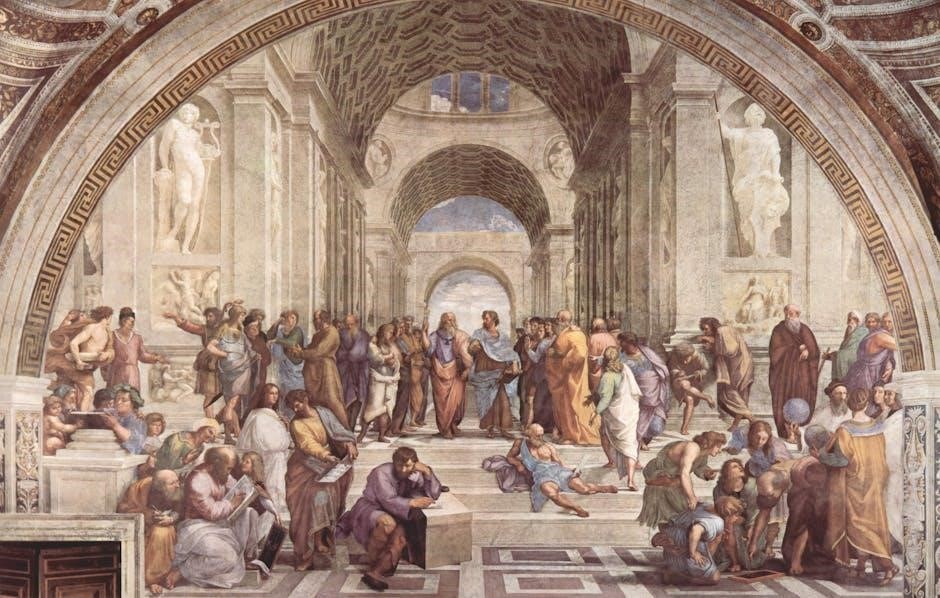plato phaedrus pdf
Plato’s Phaedrus is a rich dialogue exploring rhetoric, love, and the soul. It features Socrates and Phaedrus discussing the nature of truth and persuasion, blending philosophy with literary artistry, making it a cornerstone of Platonic thought and a timeless resource for philosophical inquiry available in various PDF editions for modern study.
Background and Context of the Dialogue
Plato’s Phaedrus is set in ancient Athens, featuring a conversation between Socrates and Phaedrus. The dialogue explores themes of rhetoric, love, and the soul, blending philosophical inquiry with literary artistry. It is one of Plato’s earlier works, likely written around 370-360 BCE. The discussion unfolds near the Ilissus River, where Phaedrus recites a speech on love, prompting Socrates to deliver his own, deeper reflections. The dialogue critiques rhetoric’s misuse while emphasizing the pursuit of truth and the immortality of the soul, making it a cornerstone of Platonic philosophy.
Key Themes and Significance of the Phaedrus
The Phaedrus delves into rhetoric, love, and the soul, exploring their interconnections. It critiques rhetoric’s misuse while advocating for truth and justice. The dialogue highlights the soul’s immortality and its ascent to divine knowledge. Plato’s theory of forms is central, linking rhetoric to philosophy. The text’s literary artistry and philosophical depth make it a cornerstone of Western thought, influencing literature and philosophy for centuries. Its enduring relevance lies in its exploration of human nature, truth, and the ideal philosopher’s pursuit of wisdom, offering insights still studied today in various PDF editions.

Major Themes in the Phaedrus
The Phaedrus explores rhetoric, love, and the soul, critiquing rhetoric’s misuse while emphasizing truth and justice. It delves into the soul’s immortality and the theory of forms, linking rhetoric to philosophy and the pursuit of divine knowledge.
The Nature of Rhetoric and Its Importance
In the Phaedrus, Socrates critiques rhetoric as mere persuasion, often detached from truth. He argues that true rhetoric must be grounded in philosophy, understanding the soul and justice. This emphasizes rhetoric’s potential to elevate or degrade, highlighting its ethical dimension and the need for a harmonious blend of art and wisdom in communication.
The Philosophy of Love and the Soul
The Phaedrus explores love as a divine force, elevating the soul toward wisdom. Socrates describes the soul as immortal, with love acting as a catalyst for spiritual ascent. This theory posits that true love transcends physical desire, aiming to reunite with the Forms, reflecting Plato’s belief in the soul’s immortality and its quest for eternal truths, offering a profound perspective on human connection and the pursuit of enlightenment through love’s transformative power.
The Theory of Forms and Their Relevance

The Phaedrus underscores Plato’s Theory of Forms, positing that abstract, perfect entities (e.g., Justice, Beauty) are the true reality. These Forms, eternal and immutable, serve as the ultimate references for earthly concepts; Socrates argues that the soul’s immortality allows it to glimpse these Forms, enabling knowledge through recollection. This theory is central to understanding the dialogue’s themes, as it connects rhetoric, love, and the soul’s ascent toward enlightenment, emphasizing the pursuit of timeless truths over fleeting appearances, thus grounding philosophical inquiry in the eternal and divine.

Structure and Composition of the Dialogue
The Phaedrus is structured as a conversation between Socrates and Phaedrus, unfolding through speeches on love and rhetoric. Its composition blends philosophical debate with poetic imagery, creating a dynamic interplay of ideas and emotions that explore the nature of truth, beauty, and the soul.
Overview of the Dialogue’s Structure
The Phaedrus begins with Phaedrus reciting a speech by Lysias on love, prompting Socrates to deliver two speeches in response. The dialogue unfolds in a natural setting, with Socrates and Phaedrus engaging in a philosophical debate about rhetoric, love, and the soul. Socrates’ first speech critiques Lysias’ arguments, while his second speech offers a deeper, mystical exploration of love. The dialogue concludes with a discussion on the ideal form of rhetoric, emphasizing truth and philosophy over mere persuasion, thus providing a structured exploration of Plato’s key themes.
Analysis of the Speeches in the Phaedrus
The speeches in the Phaedrus reveal a progression from superficial to profound philosophical inquiry. Lysias’ speech argues for loving non-lovers, emphasizing practical benefits. Socrates’ first speech appears to concur but is later critiqued as flawed. His second speech elevates the discussion, portraying love as a divine force tied to the soul’s immortality and the pursuit of wisdom. This contrast highlights Plato’s exploration of rhetoric’s purpose, distinguishing between mere persuasion and truth-seeking dialogue, thus showcasing the dialogue’s depth and philosophical richness.
The Role of Setting in the Dialogue
The setting of the Phaedrus is a serene, natural environment outside Athens, near a stream; This idyllic backdrop contrasts with the urban setting of other dialogues, fostering a relaxed atmosphere conducive to deep philosophical discussion. The countryside locale allows Socrates and Phaedrus to engage in introspective dialogue, free from distractions. The natural beauty mirrors the dialogue’s themes of harmony and the soul’s pursuit of truth, emphasizing the interplay between environment and intellectual inquiry. This setting underscores Plato’s use of ambiance to enhance philosophical reflection and dialogue.

Key Figures in the Phaedrus
Socrates, the central character, guides the dialogue with his philosophical inquiries. Phaedrus, a young intellectual, engages in the discussion, while Lysias influences the conversation through his speeches.

Socrates as the Central Character

Socrates is the central figure in Plato’s Phaedrus, guiding the dialogue with his characteristic method of questioning. He engages Phaedrus in a deep exploration of rhetoric, love, and the soul, demonstrating his philosophical depth. Socrates’ speeches reveal his belief in the immortality of the soul and the importance of seeking truth. His interactions highlight his role as a teacher and philosopher, emphasizing the pursuit of wisdom over mere persuasion. Socrates’ presence dominates the dialogue, shaping its themes and ideas.
Phaedrus and His Role in the Dialogue

Phaedrus serves as the interlocutor and catalyst for the dialogue, engaging Socrates in a discussion about rhetoric and love. His enthusiasm for rhetoric, particularly Lysias’ speech, prompts Socrates to delve into deeper philosophical reflections. Phaedrus’ curiosity and admiration for eloquence make him an ideal counterpart, driving the conversation forward. His role is crucial as he represents the audience, prompting Socrates to explore the nature of truth, persuasion, and the soul. Through Phaedrus, Plato highlights the tension between rhetoric and philosophy, showcasing his significance in the dialogue’s thematic development.
Lysias and His Influence on the Conversation
Lysias, a renowned rhetorician, plays a pivotal role in the dialogue through his speech on love, which Phaedrus admires. His argument that a non-lover is more beneficial than a lover sparks Socrates’ critical engagement; Lysias’ speech represents the conventional view of rhetoric, focusing on persuasion rather than truth. Socrates challenges this, demonstrating the superiority of philosophically informed discourse. Lysias’ influence lies in prompting Socrates to explore the nature of love and rhetoric, elevating the discussion to a deeper philosophical level and highlighting the tension between mere persuasion and the pursuit of truth.

Philosophical Concepts Explored
The dialogue delves into the immortality of the soul, the relationship between knowledge and reality, and the tension between rhetoric and philosophy, offering profound insights into Platonic thought and its relevance to understanding truth and human existence through accessible PDF editions.
The Immortality of the Soul
In the Phaedrus, Plato explores the immortality of the soul through Socrates’ metaphor of the charioteer, where the soul is depicted as a divine, eternal entity. Socrates argues that the soul pre-exists the body and can access divine truths through recollection. This concept underscores the soul’s ability to transcend mortality, emphasizing its eternal nature. The dialogue also highlights the soul’s journey toward enlightenment, tying it to the pursuit of wisdom and the ultimate goal of reunifying with the divine. This idea is central to Plato’s philosophy and is extensively explored in PDF editions of the text.
The Relationship Between Knowledge and Reality
In the Phaedrus, Plato examines the relationship between knowledge and reality through Socrates’ discussion of the soul’s access to eternal truths. Socrates posits that true knowledge is not derived from sensory experience but from the soul’s recollection of the Forms, which are the immutable, divine essence of reality. This metaphysical framework establishes knowledge as a transcendental understanding of reality, attainable through reason and philosophical inquiry. Available in various PDF editions, this dialogue remains a foundational text for exploring the interplay between epistemology and ontology in Platonic philosophy.
The Tension Between Rhetoric and Philosophy
The Phaedrus highlights the tension between rhetoric and philosophy, with Socrates critiquing rhetoric for prioritizing persuasion over truth. He argues that true rhetoric must align with philosophy, seeking wisdom rather than mere manipulation. This dialogue underscores Plato’s concern with the ethical use of language, advocating for a rhetoric grounded in philosophical principles. Available in PDF editions, the text remains a vital resource for understanding the interplay between persuasive speech and the pursuit of truth in Platonic thought.

Legacy and Impact of the Phaedrus
Plato’s Phaedrus has profoundly influenced Western philosophy and literature, shaping debates on rhetoric, love, and the soul. Its themes remain relevant, with PDF editions ensuring continued study and reflection on its enduring ideas.
Historical Reception and Interpretation
Plato’s Phaedrus has sparked intense debate since its composition; Its unique blend of rhetoric, philosophy, and mythology has led to varied interpretations. Early scholars often focused on its exploration of love and the soul, while later thinkers emphasized its rhetorical theories. The dialogue’s controversial nature has made it a focal point in discussions about Plato’s intentions. Over centuries, it has influenced Western philosophy and literature, with its themes of truth, persuasion, and the ideal soul remaining central to scholarly analysis. Its enduring relevance is evident in its widespread study through PDF editions.
Influence on Western Philosophy and Literature
Plato’s Phaedrus has profoundly shaped Western philosophy and literature. Its exploration of rhetoric, truth, and the ideal soul influenced thinkers like Aristotle and later philosophers. The dialogue’s literary artistry, combining myth and dialectic, has inspired writers and scholars; Its themes of love, immortality, and the pursuit of knowledge resonate across centuries, making it a foundational text in intellectual history. The blending of philosophy with poetic expression has left an indelible mark on both philosophical inquiry and literary traditions, ensuring its continued relevance in contemporary thought.
Modern Relevance and Continued Study
Plato’s Phaedrus remains a vital text in modern philosophical and literary studies. Its themes of rhetoric, truth, and the soul resonate in contemporary debates about communication, ethics, and human nature. The dialogue’s exploration of love and immortality continues to inspire psychological and existential inquiries. With readily available PDF editions, the Phaedrus is accessible for global study, ensuring its ideas endure in academic and cultural discourse, offering timeless insights into the human condition and the pursuit of knowledge.
Popular PDF Editions and Translations
Plato’s Phaedrus is widely available in PDF formats, offering convenient access to its timeless wisdom. Popular translations by scholars like Robin Waterfield and Alexander Nehamas provide faithful renditions of the original Greek text. These editions are often enhanced with introductions, notes, and commentaries, enriching readers’ understanding. Many PDF versions are free to download from academic repositories, Google Books, and platforms like Project Gutenberg. Additionally, university presses and philosophical societies publish annotated PDFs, ensuring the dialogue remains accessible for scholarly and personal study, catering to both newcomers and seasoned philosophers.
How to Download and Study the Text
To download Plato’s Phaedrus in PDF, search for “Plato Phaedrus PDF” on academic platforms like Google Scholar or JSTOR. Websites such as Project Gutenberg and Google Books offer free editions; For a more annotated version, visit university presses or philosophical society websites. Once downloaded, read the introduction for context, then proceed slowly, taking notes on key arguments. Cross-reference with commentaries for deeper insights. Engage with discussion forums or study groups to enhance understanding and explore diverse interpretations of the dialogue.
Recommended Resources for Further Reading
For deeper exploration of the Phaedrus, consult scholarly commentaries like Ferrari’s Plato’s Phaedrus or Rowe’s translations. Academic platforms such as Google Scholar and JSTOR offer essays and articles analyzing the dialogue. Visit university presses for annotated editions. Additionally, explore resources like the Stanford Encyclopedia of Philosophy or the Internet Encyclopedia of Philosophy for overviews of key themes. Engage with online forums or philosophical communities to discuss interpretations and gain insights from diverse perspectives on Plato’s work;


